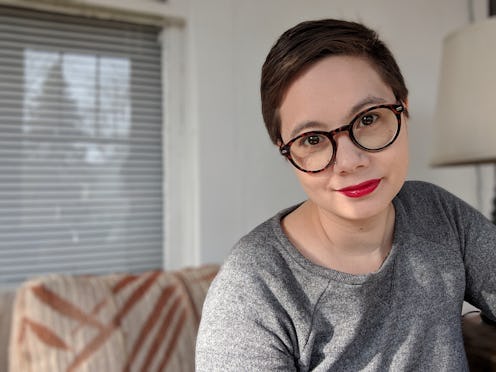Life
Please Stop Assuming My Same-Sex Friendships Are Relationships Now That You Know I’m Bisexual

Coming out as bisexual when you’re in your 30s can be super confusing. But one part of coming out that I didn’t expect is that when you're queer, and you hang out with other queer people, sometimes some heterosexual people automatically assume something romantic is going on. It’s as if some people think all queer people are attracted to each other, like we have no other option but to be with whatever queer person is in the room. But just like straight people, we have options. So now that I’m out, I’d super appreciate it if people would stop thinking my same-sex friendships are relationships.
Recently, a straight friend made a joke implying something romantic was going on between me and my bisexual friend because they'd spent the night at my house. These kinds of assumptions happen to many bisexual and queer people who have friendships with same-sex people — whether queer or straight. But, as Rebecca Shamblin, who identifies as bisexual, wrote for Ravishly "just as straight women are able to have friendships with men that don’t involve sex, queer women are able to have friendships with women that don’t involve sex."
I hear a lot of gender reversals when people talk about this friendship. I've been told my friend's spouse must be very trusting to let them sleep over at my house since we're both bisexual, like they're calling upon the old men and women can't be friends trope. But you can't view my friendships with people of different genders through a heterosexual lens, because it's simply not the same thing.
I've also been told I've changed as a person after coming out as bisexual. It's as if my sexual orientation is somehow tied to my moral character — which, obviously, it's not. But it's kind of comforting to know I'm also not alone in this experience: Shamblin wrote, "Bisexual people aren’t 'naturally promiscuous' any more than straight people, but we get slapped with the assumption that no matter which gender we are with, we are probably cheating on that person with someone from the other gender."
All these things people have said about me are essentially the same old myths about bisexuality that are just plain wrong, like bisexual people are more likely to cheat, they can't be monogamous, and that bisexual people are promiscuous. Yes, those are real misconceptions about bisexuality, and they're super hurtful.
“Bisexual people face double discrimination in multiple settings — bisexual people are often invisible, rejected, invalidated [and] stigmatized in the heterosexual community, as well as the traditional LGBTQ communities,” Ethan Mereish, an assistant professor at American University, told NBC News. “Given that isolation and discrimination, bi people might be experiencing increased factors that might make them more lonely or isolated.”
But bisexual people are just people; they just happen to be attracted to more than one gender, which doesn't mean they're attracted to every single person on the face of the planet.
Let's put it this way: would you assume every straight person was attracted to each other? Because that's what people are doing when they assume there's something romantic going on between me and other people who are bisexual or queer. Just because we're both queer doesn't mean we're each other's type, or that there's a mutual attraction. That's like saying, "Hey, since you're both straight, you're sure to hit it off!"
And, honestly, having other bisexual friends in a world that isn't all that friendly to bisexual people is super awesome. Autostraddle writer Raquel was quoted in an article as saying, "My bi friendships have been a safe space to just be myself and b*tch, and that may not sound like much, but it’s everything. The understanding friendships you feel safe enough in to rant and to be vulnerable are the best.”
Romantic relationships can be awkward and a little embarrassing for anyone, no matter what your sexual orientation is. So rather than making assumptions about people's relationships, maybe just give them the space to let you know what's up themselves? Or, you know, just ask them? Trust me; it would make a world of difference.